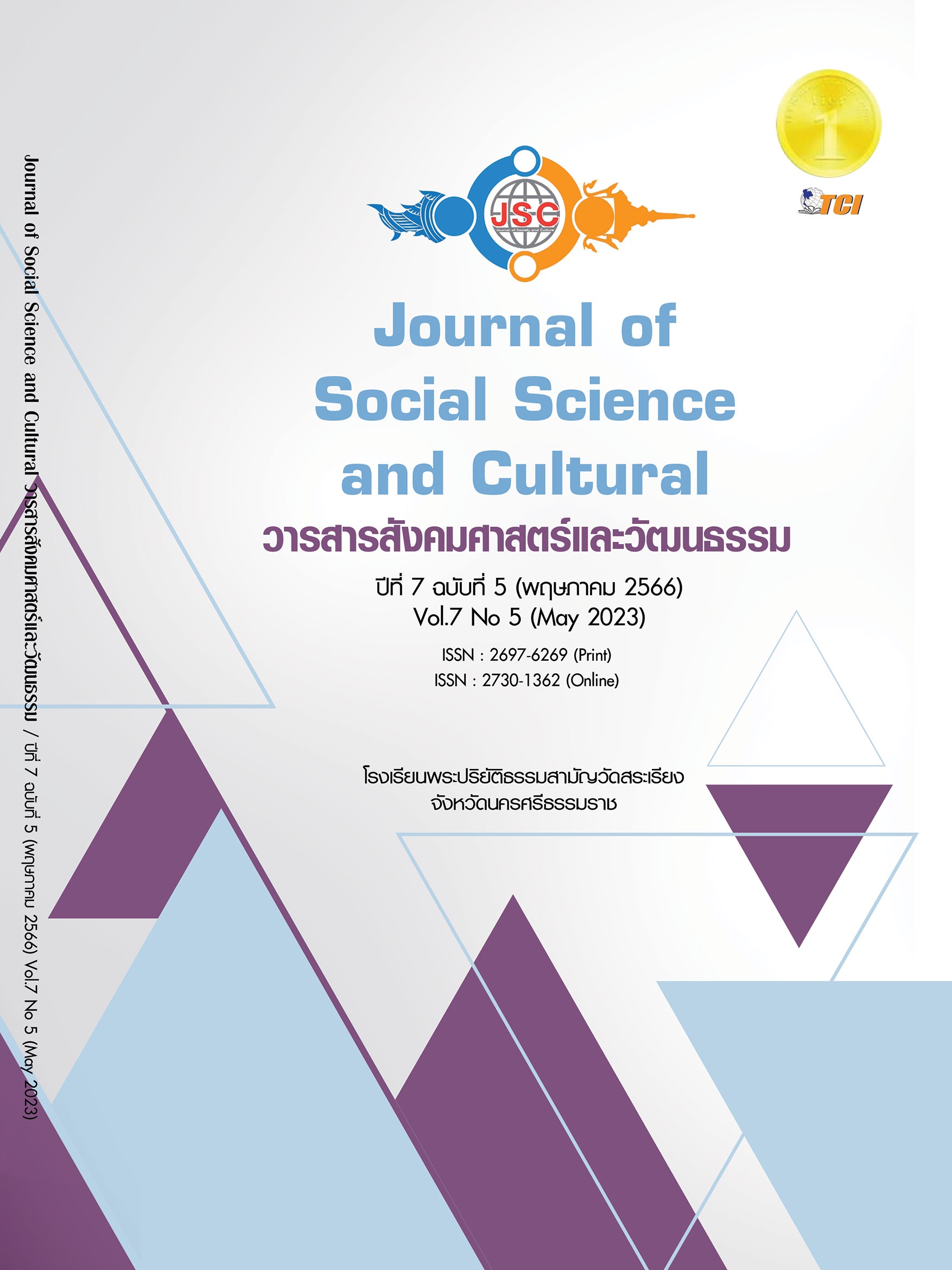DEVELOPMENT OF A LEARNING MANAGEMENT MODEL FOR ENHANCING EXECUTIVE FUNCTION OF EARLY ELEMENTARY SCHOOL STUDENTS
Main Article Content
Abstract
This article aims to develop a learning management model enhancing the ability to think and manage themselves (Executive Function) of early elementary school students. and the ability to think about managing themselves (Executive Function) of early elementary school students. The research was carried out in 2 phases, i.e. phase 1 creating and developing the learning management model, and phase 2 studying the results of using the learning management model. The sample is 31 students in Grade 2/3 who are studying in the first semester of the academic year 2022 at Worapat School obtained by multi-stage random sampling. Tools used to collect information include: Behavior observation form, Scoring Rubric, reflective form of learners, which Data analysis was performed using content analysis for qualitative data. and one-way repeated measure ANOVA for quantitative data. The research results of learning management model development found that the learning management model enhancing the ability to think and manage themselves (Executive Function) of early elementary school students has 4 stages: 1. Learn 2. Plan 3. Do 4. Reflect. In addition, the results of using the learning management model were higher in all 4 cognitive ability measurements respectively. The first assessment had a mean score of 30.67, second had a mean score of 32.51, third had a mean score of 37.67, and forth had a mean score of 37.77. The research results explain that The developed learning style can enhance the ability to think and manage themselves (Executive Function) of the early elementary school students.
Article Details
References
เกดิษฐ์ จันทร์ขจร. (2562). การบริหารจัดการของสมองขั้นสูง :แนวคิดและแนวทางประยุกต์เพื่อพัฒนาการเรียนรู้ของผู้เรียน. วารสารวิชาการศึกษาศาสตร์ คณะศึกษาศาสตร์ มหาวิทยาลัยศรีนครินทรวิโรฒ, 20(2), 111-116.
ยศวีร์ สายฟ้า. (2557). ประเด็นท้าทายในการจัดการประถมศึกษา: จุดเริ่มต้นของการเปลี่ยนแปลงและพัฒนา. วารสารครุศาสตร์.ปีที่ 4, 2(3), 126-142.
ศักดิ์ชัย ใจซื่อตรง. (2561). การพัฒนารูปแบบการจัดประสบการณ์ศิลปะที่ส่งเสริมทักษะการจีดการสมอง(EF) สำหรับเด็กปฐมวัย. ใน ดุษฎีนิพนธ์ปรัชญาดุษฎีบัณฑิต สาขาการวิจัยและพัฒนาหลักสูตร. มหาวิทยาลัยศรีนครินทรวิโรฒ.
สำนักงานกองทุนสนับสนุนการสร้างเสริมสุขภาพ. (2561a). คู่มือพัฒนาทักษะสมอง EF Executive Functions สำหรับครูปฐมวัย. กรุงเทพมหานคร: บริษัท มติชน (จำกัด) มหาชน.
สำนักงานกองทุนสนับสนุนการสร้างเสริมสุขภาพ. (2561b). คู่มือพัฒนาทักษะสมองEF Executive Functionsในเด็กวัย 7-12 ปี สำหรับพ่อแม่และครู. กรุงเทพมหานคร: บริษัท โรงพิมพ์อักษรสัมพันธ์ (1987) จำกัด.
สุคนธา เพชรศิริ. (2563). การพัฒนารูปแบบ RRL:Review&Repeat Learning เรียนซ้ำ ย้ำทวน เพื่อยกระดับผลสัมฤทธิ์ทางการเรียนของผู้เรียนสำหรับการบริหารงานวิชาการด้านการจัดการเรียนการสอน. เรียกใช้เมื่อ 12 พฤษภาคม 2564 จาก https://www. kroobannok.com/board_view.php?b_id=184543&bcat_id=16
Canet Juric Lorena et al. (2013). Development patterns of executive functions in children. The Spanish Journal of Psychology, 15(6), 93-102.
Chanruang, W. (2006). Development of analytical thinking enhancement program For students Prathom 4. Master of Education Thesis: Thepsatri Rajabhat University.
DiTullio, G. (2018). Helping Students Develop Executive Function Skills. Retrieved January 12, 2564, from https://www.edutopia.org/article/helping-students-develop-executive-function-skills
Monica eileen wolfe. (2004). Executive function processes: inhibition, working memory,planning and attention in children and youth with attentiondeficit hyperactivity disorder. Doctor of philosophy major subject : school psychology: Texas A&M University.
Rosseli et al. (2019). Age, executive functioning, and decision-making styles in adults: a moderated mediation model. A Journal on Normal and Dysfunctional Development. Retrieved May 12, 2564, from https://lahore.comsats.edu.pk/Papers/Abstracts/7418586380712113721735.pdf


